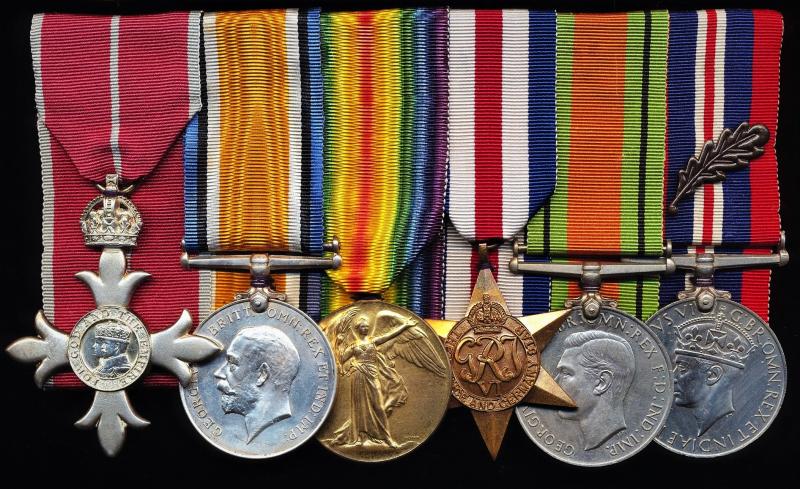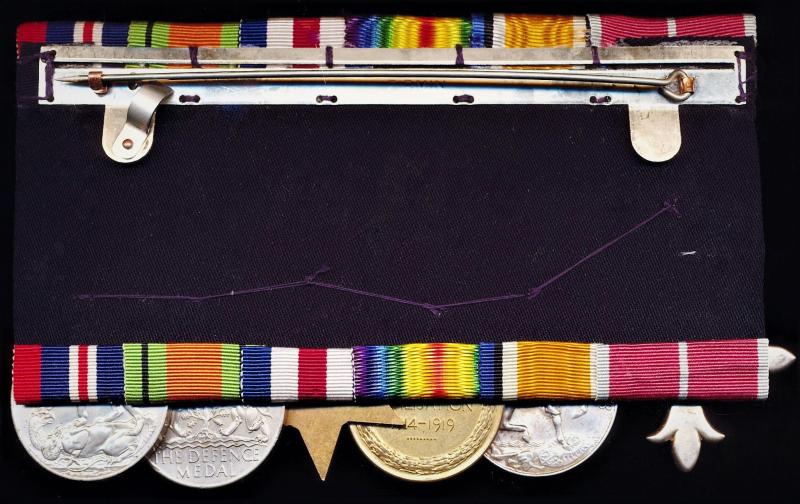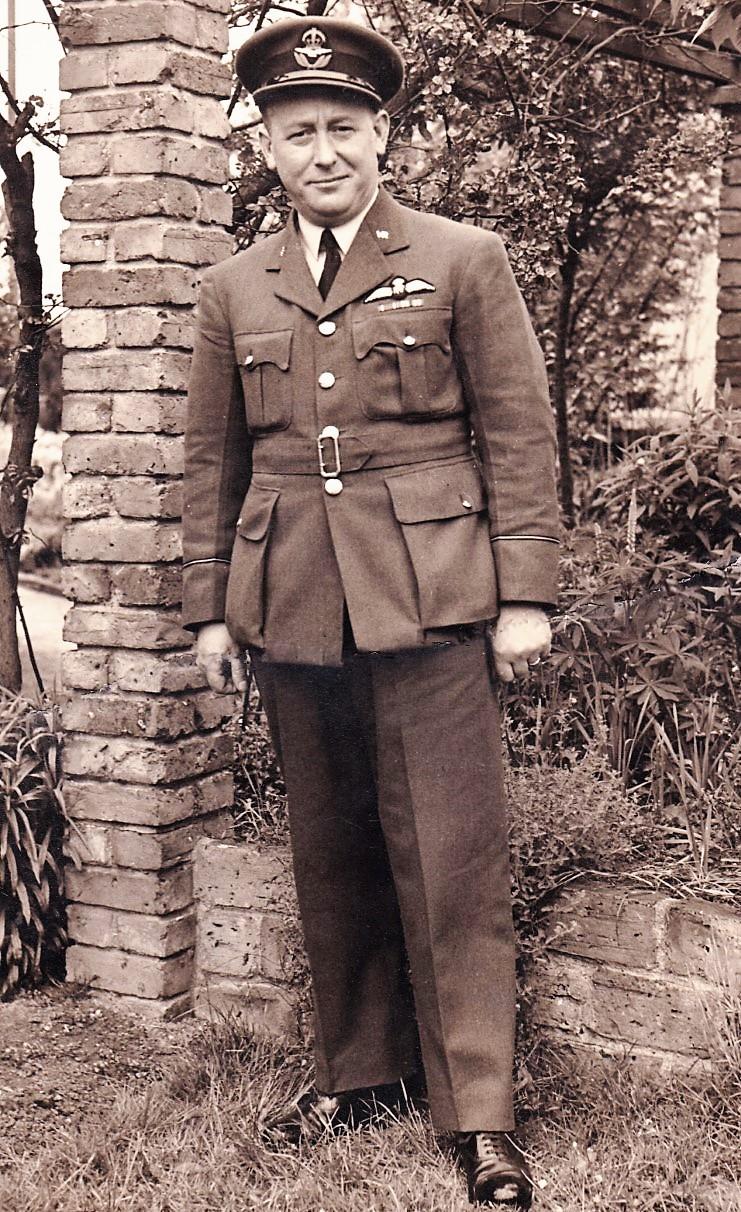A D-Day Air Traffic Control MBE & World Wars group of 6 to a former Great War 'Bomber Pilot': Squadron-Leader William 'Bill' Albert Redvers Pepper, M.B.E., Royal Air Force Volunteer Reserve late 55 Squadron Royal Air Force & Royal Naval Air Service
- Member of the Order of the British Empire (Mily). 2nd type
- British War Medal. Silver issue (2/Lt. W. A. R. Pepper. R.A.F.)
- Interallied Victory Medal (2/Lt. W. A. R. Pepper. R.A.F.)
- The France & Germany Star. No clasp
- Defence Medal
- War Medal. With bronze Oakleaf emblem (Mention in Despatches)
Sold together with some soft-copy research including MBE recommendation and photographs (including one from WW2 showing recipient wearing his 'Pilots Brevet' and with the ribands of his 'Great War pair on his RAFVR uniform), that will be forwarded to the buyer by email-attachment
Decorations verification: The recipients awards of the MID & MBE were published in the respective issues of the London Gazette cited below:
a). Mention-in-Despatches, published in London Gazette issue dated 1 January 1943. Ranl at time was Acting Filght Lieutenant. The preamble to the award states:
Quote,
Air Ministry, ist January, 1943.
The KING has been graciously pleased to give orders for the publication of the names, of the following personnel who have been mentioned in despatches by Air Officers Commanding-in-chief : —
Unquote.
b). M.B.E., published in London Gazette issue dated 14 June 1945. The recommendation for the award of the MBE, was not published, but the recommendation is extant and is quoted below:
Quote,
Acting Squadron Leader William Albert Redvers PEPPER (604088) - Royal Air Force Station Northolt: Squadron-Leader Pepper has been Senior Flying Control Officer, at Royal Air Force Station, Northolt, since May 1944. During this period the amount of work, especially since D-Day, has been exceptionally heavy. This officer has shown the greatest ability in organising his section and in handling the traffic, often under considerable difficulty. The congestion of large aircraft on the aerodrome has been skillfully handled in spite of the fact that the accommodation layout was designed for fighter aircraft and taxy tracks are awkward for heavy aircraft. There is little doubt that Squadron Leader Pepper and his staff have materially assisted to a considerable extent the furthering of the war effort by the efficient performance of their duties under most difficult conditions. In addition they have been responsible for the despatch and homing of aircraft carrying the most important personages, including H.M. the King
Unquote.
William Albert Redvers Pepper, was a native of London, England, where he was born on 4 September 1899. Hereinafter referred to as 'Bill', as he liked to be known, when old enough (he was still a teenager) he joined the Royal Navy, being appointed a 'Probationary Flight Officer' in the Royal Naval Air Service, or R.N.A..S, on, 28 October 1917. An early 'Aviator' Bill, transferred to the Royal Air Force, with which force as a 2nd Lieutenant, he became a qualified 'Pilot' when he attained his Royal Aero Club Certificate on 15 July 1918, at which time and thereafter he proudly wore a winged pilots 'Brevet' brevet on his service tunic. Shortly after qualifying as a pilot, Bill was posted overseas to France, where he joined 55 Squadron, Royal Air Force, flying DH4's /DH9's bomber aircraft as part of the recently formed Independent Air Force
Independent Air Force: The Independent Air Force came into being on 6 June 1918 with its headquarters situated near Nancy in France. Trenchard took over tactical command of the VIII Brigade from Haig on 5 June 1918 and complete control on 15 June 1918, when Newall became the deputy commander of the Independent Force.As commander, Trenchard reported directly to Sir William Weir the Air Minister, bypassing the Chief of the Air Staff, Frederick Sykes
The Independent Air Force eventually consisted of nine squadrons of aircraft which were equipped with
- de Havilland DH4s
- de Havilland DH9s and de Havilland DH.9As
- Handley Page 0/400s
- Royal Aircraft Factory FE2bs
- Sopwith Camels for escort duties
The IAF commenced operations in June 1918, when 12 DH4s of 55 Squadron were despatched to bomb targets around Coblenz and 11 DH4s of 99 Squadron attacked rail targets at Thionville. During the last five months of World War I, Independent Air Force aircraft dropped 550 long tons (560 t) of bombs (for 109 aircraft lost) including 390 long tons (400 t) dropped by night. Over 220 long tons (220 t) were dropped on German aerodromes, which Trenchard justified by pointing out that while the Germans were stronger than the British in the air, their aircraft might be destroyed on the ground. Trenchard argued that his policy was vindicated by the fact the during the period from 5 June to 11 November 1918, German attacks on British aerodromes were minimal and no British aircraft were destroyed on the ground by bombing
Bill survived the Great War, and for his services was awarded the British War and Interallied Victory medals. On return to civilian life, Bill started a long and successful career in the world of Cinema & Showbusiness, where he excelled in marketing, to the extent that he became Manager & General Manager respectively of the largest Cinema's in the London West end, viz., the Regal at Marble Arch, nad later The Warner Theatre Leicester Square.The London newspapers of the 1930's are packed with references / artciles pertaining to 'Bill' Pepper's work in the entertainment world. He also kept his hand-in as an aviator, being a founder member of the Film Flying Club of Great Britain, as described in the 'Kinematograph Weekly' issue of, 4 May 1933.
During the Second World War, Bill was back in uniform as an officer of the Royal Air Force Volunteer Reserve. He was awarded a 'Mention in Despatches' on 1 January 1943, and in 1945 was further decorated when appointed a Member of the Order of the British Empire - this latter for his services at R.A.F. Northolt 1944-1945, and in particular for his able work with Air Traffic Control during the D-Day operations as cited in his award recommendation. The mention of his work with 'Important Personages' including the King-Emperor at R.A.F. Northolt, may give some indication that he was perhaps involved in a some sort of supporting capacity, on a visit, or visits to France / North West Europe in 1944-45, as evinced by the inclusion of a France & Germany Star in the group of medals
William 'Bill' Albert Redvers Pepper, M.B.E., was residing at Bath Lodge, 8 Bath Road, Reading, Berkshire, England, when he died on, 29 December 1982
Condition: EF
Code: 22640







